5 Causes of a Clunking Noise When Accelerating or Decelerating
Few car noises are as alarming as a loud clunk when you accelerate or brake. If your car clunks when speeding up or slowing down, don’t ignore it as it’s often a sign of serious issues.
In this article, we’ll look the most common causes of this worrisome clunking noise and how to fix it before it leads to bigger problems down the road.
Is it safe to continue driving until you get it repaired? Well, it depends. We’ll explain why below.

Reasons You Hear a Clunking Noise
There are a number of reasons that you might hear a clunking noise coming from your vehicle when accelerating or slowing down. Recognizing these potential issues can prove helpful when attempting to resolve the situation at hand in an expedited fashion.
The following are several of the most common sources of automotive clunking noises.
#1 – Worn Engine Mount
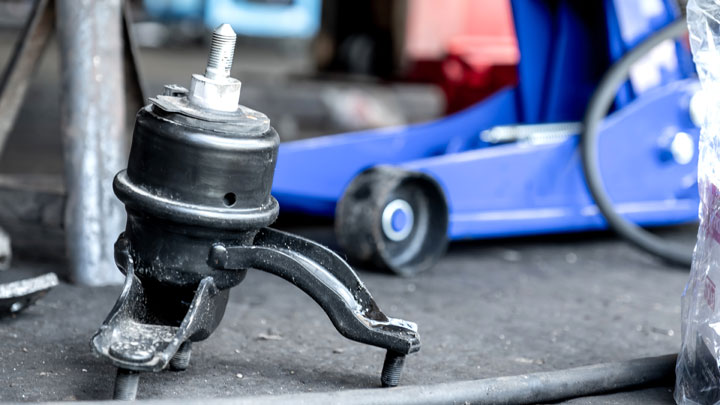
One of the most common causes of clunking when accelerating is a worn or otherwise damaged engine mount.
Typically, an engine’s individual mounts absorb much of the movement associated with engine operation. However, worn engine mounts lose much of this ability, allowing a certain degree of engine movement that is often audible.
How to Fix:
The only remedy for engine mount-related noise, is to replace the mount in question or ideally, all engine mounts. This is a job that can sometimes be handled at home, by the average DIYer.
#2 – Worn Transmission Mount
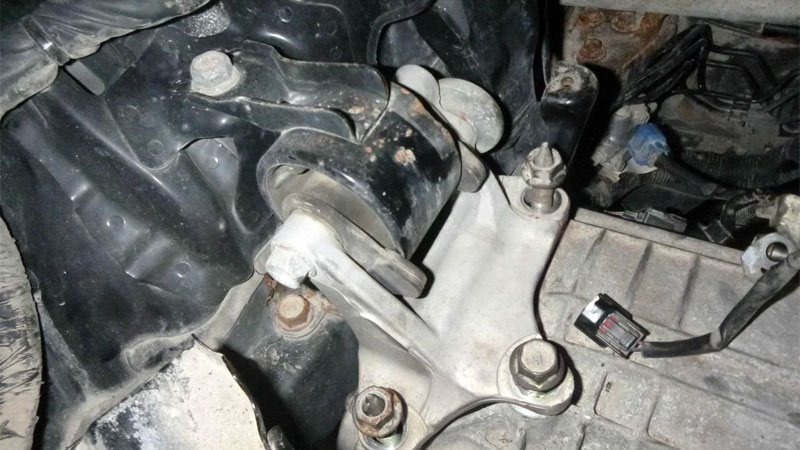
Just like engine mounts, transmission mounts age, losing their ability to absorb drivetrain movement. This often results in a thumping or clunking noise that is heard during acceleration.
As transmission mount wear worsens, these noises will only continue to become more evident. In the most severe of cases, this clunking can even be felt reverberating throughout the vehicle.
How To Fix:
Since transmission mounts are considered wear items, the only viable means of eliminating transmission mount-related noises is to replace the bad mount. It’s a good idea to replace all transmission mounts at once, as all likely exhibit similar wear.
#3 – Compromised CV Joint
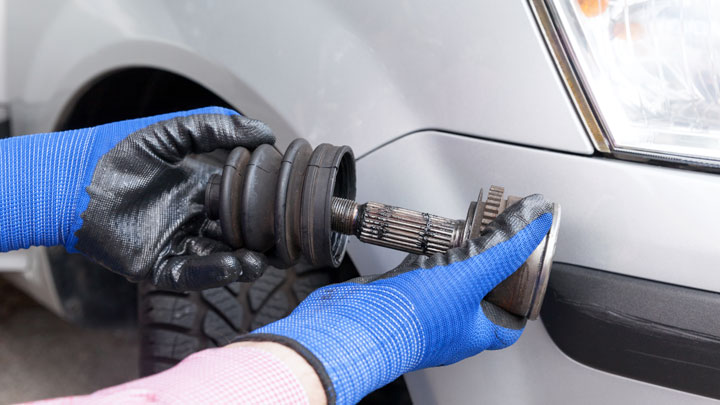
Another common cause of “clunking” during acceleration or deceleration is a worn or damaged CV joint.
CV joints are contained within the CV axles of FWD and 4WD vehicles. These joints allow the drive axles of such vehicles to index as necessary during cornering. With time, these joints become worn, allowing a certain degree of slop, or free-play.
How To Fix:
The best way to address CV joint-related noise is to replace the offending CV joint. However, today most shops replace a vehicle’s CV axle as a whole when wear is evident, as doing so often proves more cost effective.
In certain cases, a CV joint might be able to be greased at its boot, to prolong replacement.
#4 – Worn U-Joint
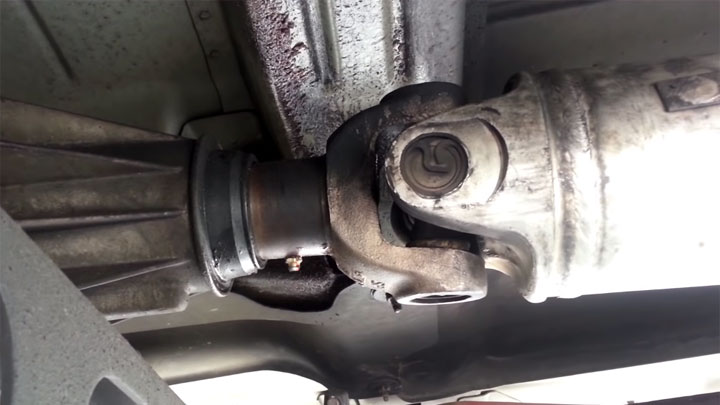
If your vehicle is producing a clunking noise during acceleration or deceleration and is of a RWD or 4WD configuration, you might want to perform a thorough U-joint inspection.
U-joints allow a vehicle’s driveshaft to achieve the appropriate inclination, between the transmission and differential. When these joints wear, they often chatter or clunk within their yoke.
How To Fix:
Though regularly greasing a vehicle’s U-joints will help keep driveline noise to a minimum, this practice will not remedy wear that has already occurred. Therefore, the only permanent way to remedy U-joint related noise is to replace the defective U-joint as a whole.
#5 – Worn Suspension Components
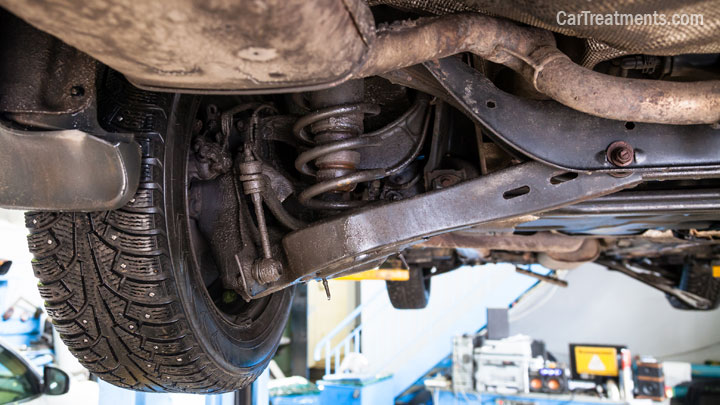
A vehicle’s suspension components prevent forward-to-aft movement during acceleration and braking. When these components become worn beyond reason, this movement becomes far more evident, and can even lead to audible clunking, if a vehicle’s undercarriage is allowed to anchor against its bump stops.
How To Fix:
The only way to eliminate suspension related noise as a whole, is to replace all worn or damaged shocks, struts, and leaf springs. It is always advisable to replace such components in pairs, as wear is almost always similar from one end of an axle to the other.
Is It Safe to Continue Driving?
Unfortunately, the answer is… it depends. This type of issue is best answered on a case-by-case basis. The source of certain clunking noises is far more concerning than others, thereby making continued driving unadvisable.
On the other hand, certain issues that are known to cause clunking noises, will not prevent you from driving, albeit temporarily.
For example, if a single clunk is heard when decelerating to a stop, it is possible that you are dealing with an excessively worn shock or strut. While this needs to be addressed, it will not stop you from commuting for a couple of days, until a repair can be made.
By contrast, a clunk caused by a severely worn U-joint is something that needs to be addressed immediately.
In any event, you shouldn’t necessarily attempt to drive a vehicle when the source of a clunking noise has not yet been determined. Doing so opens up the possibility of incurring further vehicle damage, and can even pose a defined safety risk.
No matter what, repair of any underlying issue should not be put off any longer than absolutely necessary.
Other Types of Noises That Can Be a Cause for Concern
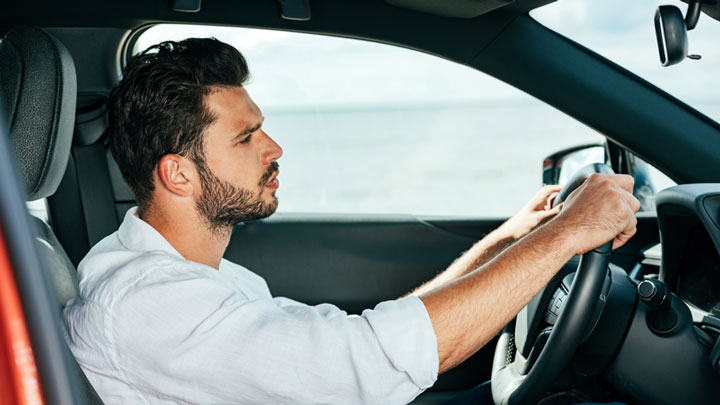
There are several additional types of automotive noises to listen for, that often indicate the onset of one or more mechanical issues. These types of noises should be investigated thoroughly, to identify their source.
The following are some of the most prominent noises that tend to be cause for concern.
Grinding
Grinding sounds should always be cause for concern when heard from the driver’s seat. In almost every case, grinding noises indicate metal-to-metal contact, any of which can be potentially damaging. The root cause of such noises must be identified and repaired as soon as possible.
Possible Causes:
Rattling
There are many different scenarios in which a rattle of one sort or another can be heard coming from various quadrants of a vehicle. Luckily, many such issues tend to be relatively easy to isolate and repair. Nonetheless, these noises should not be overlooked or ignored.
Possible Causes:
- Loose exhaust heat shield
- Unsecured skid plate or panel trim
- Damaged exhaust hanger
Knocking/Pinging
Most knocking or pinging noises can be isolated to a vehicle’s engine, and are almost always cause for concern. If noises of this nature are heard, you should get your vehicle to a shop for diagnosis and repair as soon as possible.
Ignoring these types of noises can lead to significant engine damage, under certain circumstances.
Possible Causes:
- Incorrect octane fuel
- Faulty valve lifter
- Progressive bearing wear
- Damaged rocker
- 5 Symptoms of an EVAP Leak (and Repair Cost) - Apr 27, 2024
- P0480 Code (Symptoms, Causes, and How to Fix) - Apr 19, 2024
- Car Temperature Gauge Stopped Working? (Here’s Why) - Apr 15, 2024
